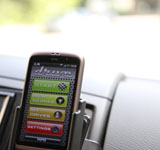“Using your phone in the car cuts costs and pollution – and it can save lives”
Peter Händel wants you to make your mobile phone a part of the car’s dashboard. The KTH Professor of Signal Processing has helped create a new mobile application for safer and more efficient driving. “In the public debate, drivers are often warned about using a mobile phone while driving, but I say the opposite: your mobile phone should be seen as an extension of the car’s dashboard.”
Five years ago, Händel introduced the idea of the thermovision camera in our cars to avoid wildlife accidents. Since then, touchscreen mobile phones have appeared on the market and created new opportunities for pioneering intelligent driver support. Many of the newer phones include GPS navigation, video and/or still cameras, accelerometers and gyroscopes.
“People are carrying around advanced signal processing platforms these days,” he says. “And they can be used to make driving safer and more efficient.”
Händel’s team of researchers have used signal processing technology in their new mobile app game, where drivers earn points by driving safely and fuel-efficiently.
The application incorporates directly measurable metrics such as velocity and acceleration, and it also indirectly calculates fuel consumption, road elevation, and engine speed.
The driver wins stars as a reward for correct driving. But the wrong driving habits—even too-slow acceleration, which consumes more energy than necessary—brings a warning in the form of a flashing red symbol.
“Efficient driving calls for distinct acceleration, shifting to a higher gear as the car reaches the proper speed, and limiting the use of the brakes. This ‘eco-driving’ can reduce fuel consumption by up to 15 or 20 per cent” Händel says.

Do people complain about your driving? With Händel’s mobile app you can compete against yourself and others, and be evaluated for safety and environmental performance.
“The game is all about thinking ahead, and drivers who plan their driving automatically drive more safely,” he says.
The mobile app for eco-driving isn’t yet a commercially available product, but Händel would like to see similar pre-packaged apps that can be downloaded to mobile phones in the future.
“So far, we’ve mainly just seen the communication aspects of mobile telephones. Every day, an endless array of new apps are being created and now it’s time to take advantage of all the advanced signal processing functions smartphones can offer,” says Händel.
He’s critical of the appearance of the typical, classic design of the car dashboard.
“It would suffice with a speedometer, tachometer and fuel gauge, along with a smartphone. The oil and water temperature gauges were useful about 50 years ago, but that information doesn’t mean much to drivers today.”
In 2008, Händel received the Golden Moose award from Sweden’s Moose Injury Fund Association (Älgskadefondsföreningen) for his work on infrared technology that helps prevent collisions involving animals without requiring the driver to switch focus between the screen and the windscreen.
For more information: Peter Händel, +46-8-790 75 95; peter.handel@ee.kth.se.
Text and photo: Katarina Ahlfort

